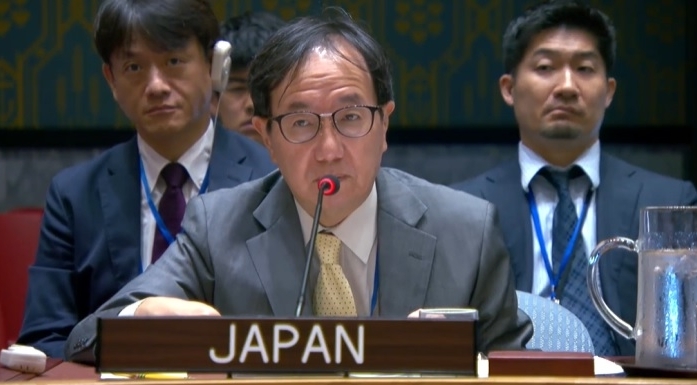アフガニスタン情勢に関する安保理ブリーフィングにおける山﨑大使ステートメント
令和6年6月21日

(As delivered)
Thank you, Mr. President.
I would like to thank Special Representative Otunbayeva and Director Doughten of OCHA for providing informative updates on the situation. I also thank Ms. Manizha Wafeq for her enlightening briefing on the challenging status of Afghan women.
In two months, it will be three years since the Taliban returned to power in 2021. Although there have been some positive developments such as the overall improvement of the security situation and the reduction in poppy production, the human rights situation remains severe and continues to be a concern for the international community.
The humanitarian situation also remains dire while resource constraints have been exacerbated by earthquakes, flash floods, and the mass return of Afghan citizens. In this regard, we are deeply saddened by the large number of casualties and extensive damage caused by the floods in May. We express our condolences to the victims and their bereaved families. Japan provided emergency assistance in response to the flood damage. As expressed in the stakeout just led by the Republic of Korea, the impact of climate change is negatively affecting the people of Afghanistan in various ways.
Challenges faced by Afghanistan are certainly not limited to climate change and are wide ranging, from counternarcotics, counterterrorism, economy, and education and employment of women, among others. However, these challenges cannot be addressed by Afghanistan itself or the neighboring countries alone. We, the international community, can and should help Afghanistan ease the suffering of its own people.
Confidence-building between the international community and Afghanistan through concrete cooperation on “No Regret” issues is a prerequisite to that end. The Doha Format is the only platform we currently have in moving this process forward. At the upcoming special envoys' meeting in Doha, or “Doha 3”, Japan is keen to have a candid exchange of views on how we can advance concrete cooperation. The voices of various actors, including women, are also important. Japan stands ready to make positive contributions in any area that will be conducive to improving the situation.
Mr. President,
Human rights, especially of women and girls, are critical. Japan has not compromised these aspects. Recognizing the “Doha 3” as a starting point of our concrete engagement with the Taliban, we strongly hope that they will acknowledge that education and employment for women are essential requirements for the development of Afghanistan. We also continue to urge the Taliban to rescind its repressive measures and achieve an Afghan society where women's rights are upheld.
In addition to issues related to women’s rights, the Secretary-General report mentioned that public protests in multiple provinces were held to express concerns over economic and livelihood issues. As our Embassy in Kabul has called on the Taliban directly and repeatedly, if the Taliban calls itself a responsible governing entity, it must respond to the plight of these people and take action. That is why the Taliban should listen to the views of the participants in “Doha 3” and work to create an environment in which the international community can devote its resources to Afghanistan. We, the international community, should send this message to the Taliban in one voice.
This is a long-term process and someone needs to manage, facilitate and coordinate our efforts. Afghanistan’s situation necessitates such a person, not because it is a country of conflict, but because the international community desires an Afghanistan at peace with itself and its neighbours, fully reintegrated to the international community and meeting international engagements.
Mr. President,
I would like to take this opportunity to reiterate Japan’s full support to UNAMA, whose role is essential and has broad support, as evidenced by the unanimous renewal of its mandate in March.
We appreciate the United Nations for its efforts in preparation for “Doha 3” including the visit to Afghanistan by USG DiCarlo in May and coordination to strike a balance among various stakeholders. Our appreciation also goes to the Government of Qatar for their generosity in hosting this meeting once again. We strongly hope it will be a meaningful occasion for the future of Afghanistan. We must seize this opportunity.
Japan, as the penholder on this file and as a country that has a presence on the ground, will continue to actively address Afghanistan issues.
I thank you.
